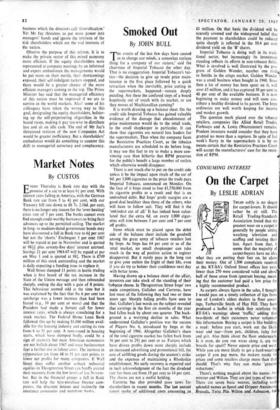Smoked Out
By JOHN BULL
It is worth drawing up a balance sheet. On the credit side Imperial Tobacco has gained valuable evidence of the damage that abandonment of price maintenance would do to the retail trade, to the small shopkeeper in particular. It can show that cigarettes are natural loss leaders for the supermarkets. Thus when the company faces the Restrictive Practices Court, as the tobadco manufacturers are scheduled to do before long, it may use this fact to try to make a more con- vincing case than hitherto that RPM preserves for the public's benefit a large number of outlets which otherwise would disappear.
There is not much else to put on the credit side unless it be the impact upon rivals of the cut of 6d. per 1,000 cigarettes in the price the trade pays Imperial Tobacco, announced on Monday. On the face of it Imps stand to lose £1,750,000 from its cigarette profits as a result and that is an undoubted debit. But Imps' profit margins are a' good deal healthier than those of the others, who will have to follow suit. They will find it the 'unkindest cut of all.' It has indeed been calcu- lated that the extra 6d. on every 1,000 cigar- ettes will trim between 5 per cent and 7 per cent off profits.
Items which must be placed upon the debit side of the balance sheet include the goodwill among the great army of tobacco retailers lost by Imps. As Imps has 64 per cent or so of the total market, no small shopkeeper can take much in the way of positive action to register disapproval. But it rarely pays in the long run to give your outlets the fright of their life, even if you do try to bolster their confidence next day with better terms.
Having drawn up a balance sheet of the affair, investors can take stock of the standing of their ttobacte shares. In Throgmorton Street Imps' two main competitors, Gallaher and Carreras, have lost most of the following they bad two or three years ago. Sharply falling profits have seen to that. Gallaher's last words on the subject revealed that earnings in the first six months of the year had fallen back by about one quarter. The back- ground is a worrying decline in sales. What undermined Gallaher's position was the success of Players No. 6, introduced by Imps at the beginning of 1966. Altogether Gallaher's share of the total cigarette market has fallen back from 36 per cent to 293 per cent or so. Factors which have driven profits down more sharply include an increased advertising and promotional bill, the cost of airlifting goods during the seamen's strike and the expenses of maintaining a Rhodesian establishment. No early recovery is expected and in tacit acknowledgment of the fact the dividend rate has been cut from 19 per cent to 14 per cent. The shares are not a useful holding.
Carreras has also provided poor news for shareholders in recent months. The last annual report spoke of additional costs amounting to
f1 million. On that basis the dividend will be scarcely covered and the widespread belief that the payment to shareholders could be reduced quite sharply is reflected in the 10.4 per cent dividend yield on the 'B' shares Imperial Tobacco is doing well in its tradi- tional sector, but increasingly its investment standing reflects its efforts in non-tobacco fields. What is involved is well illustrated by the pro- gress of Golden Wonder, number one rival to Smiths in the crisps market. Golden Wonder was a small business when bought in 1960. Since then a lot of money has been spent on it, well over f5 million, and it has captured 30 per cent to 40 per cent of the available business. It is now beginning to make money and will soon con- tribute a healthy dividend to its parent. The Imps ordinaries are well worth keeping for income and modest growth.
The question mark placed over the tobacco retailers, companies like Allied Retail Trades, Forbuoys and A. Lewis (Westminster) remains. Prudent investors would consider that they have granted no more than a reprieve. In spite of last week's flurry in the supermarkets it is by no means certain that the Restrictive Practices Court will accept the manufacturers' case for the reten- tion of RPM.


































 Previous page
Previous page